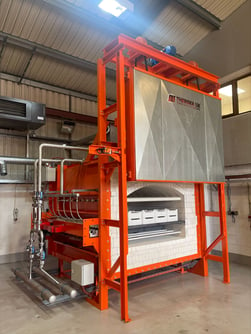Share this
What is Carbonization?
by Therser Sales Team on 09-May-2023 09:25:53
Carbonization is a process that involves the decomposition or transformation of organic materials, typically rich in carbon, into carbon-rich solid residues. It occurs through the application of heat in the absence or limited supply of oxygen. The process removes volatile components, such as water, and leaves behind carbonaceous materials.

During carbonization, organic materials undergo thermal degradation, resulting in the release of volatile gases, such as water vapor, methane, carbon dioxide, and other organic compounds. As the temperature increases, the complex organic molecules break down into simpler compounds and eventually form carbon-rich solid residues.
The carbonization process is commonly associated with the conversion of biomass, such as wood, peat, or agricultural waste, into charcoal. The organic material is heated in a controlled environment, such as a kiln or retort, with limited oxygen supply. As a result, volatile components are driven off, leaving behind a solid residue primarily composed of carbon.
Carbonization serves several purposes and finds applications in various industries:
-
Fuel production: Carbonization of biomass, such as wood or agricultural waste, produces charcoal, which can be used as a fuel source. Charcoal has a high carbon content and can be burned for heat and energy production.
-
Metallurgical processes: Carbonization is used in metallurgy for the production of carbon-based materials like coke. Coke is derived from coal through carbonization and is extensively used as a fuel and reducing agent in the iron and steel industry.
-
Activated carbon production: Carbonization is an initial step in the production of activated carbon. After carbonization, the resulting carbonaceous material is further processed to create a highly porous structure with a large surface area, making it suitable for applications like water purification, gas adsorption, and chemical filtration.
-
Carbon materials and composites: Carbonization is employed to produce carbon fibers, carbon black, carbon nanotubes, and other carbon-based materials used in various industries, including aerospace, automotive, electronics, and construction.
The specific conditions and temperature ranges for carbonization vary depending on the material being processed and the desired outcome. By carefully controlling the carbonization process parameters, manufacturers can obtain carbon-rich materials with specific properties for their intended applications.
.
Please contact our sales team today on 44 (0)1782 824453 or drop us an email to sales@therseruk.com
Share this
- Company News (90)
- Battery Materials (41)
- kiln (37)
- fabrication (29)
- Alloy (27)
- Furnace (27)
- Welding (16)
- Industrial Kilns (15)
- Battery (13)
- Ceramic Kilns (13)
- Processes (13)
- alloy fabrication (13)
- Shuttle Kilns (12)
- RTO’s (11)
- Vacancies (11)
- Hydrogen (10)
- Therser UK (9)
- Tunnel Kiln (9)
- Refractory (8)
- Therser (8)
- Wellman Furnaces (8)
- Brickwork (7)
- Case Studies (7)
- Afterburners (6)
- Fibre Lining (6)
- electric (6)
- Almor Wellman (5)
- thermal engineers (5)
- Biochar (4)
- Exhibition (4)
- Pyrolysis (4)
- Servicing (4)
- Spares (4)
- heat treatment (4)
- History (3)
- Ceramics Uk (2)
- Combustion Control Upgrades (2)
- Nitrogen (2)
- Temperature Control Rings (2)
- gas (2)
- Certificates (1)
- Instrumentation (1)
- MMC (1)
- RHK (1)
- Roller Hearth Kiln (1)
- Test Trials (1)
- aerospace (1)
- analyser (1)
- elec (1)
- oxygen (1)
- vans (1)
- September 2025 (2)
- May 2025 (2)
- March 2025 (1)
- February 2025 (2)
- January 2025 (5)
- December 2024 (5)
- November 2024 (7)
- October 2024 (5)
- September 2024 (4)
- August 2024 (14)
- July 2024 (13)
- June 2024 (2)
- May 2024 (5)
- April 2024 (13)
- March 2024 (8)
- February 2024 (12)
- January 2024 (14)
- December 2023 (6)
- November 2023 (12)
- October 2023 (24)
- September 2023 (11)
- August 2023 (11)
- July 2023 (9)
- June 2023 (15)
- May 2023 (53)
- April 2023 (5)
- March 2023 (6)
- February 2023 (7)
- January 2023 (3)
- December 2022 (8)
- November 2022 (5)
- October 2022 (11)
- September 2022 (1)
- August 2022 (2)
- July 2022 (1)
- June 2022 (2)
- May 2022 (1)
- March 2022 (1)
- February 2022 (1)
- January 2022 (1)
- December 2021 (3)
- October 2021 (1)
- August 2021 (1)
- June 2021 (1)
- May 2021 (4)
- April 2021 (2)
- March 2021 (4)
- February 2021 (2)
- December 2020 (3)
- November 2020 (1)
- September 2020 (3)
- May 2020 (1)
- April 2020 (2)
- March 2020 (1)
- January 2020 (1)
- December 2019 (1)
- July 2019 (2)
- June 2019 (1)
- April 2019 (2)
- March 2019 (3)
- February 2019 (4)
- December 2018 (1)
- November 2018 (1)
- September 2018 (2)
- August 2018 (1)
- July 2018 (1)
- May 2018 (3)
- April 2018 (1)
- February 2018 (3)
- January 2018 (2)
- December 2017 (3)
- November 2017 (1)
- October 2017 (2)
- September 2017 (4)
- August 2017 (1)
- July 2017 (2)
- June 2017 (2)
- May 2017 (3)
- April 2017 (3)

